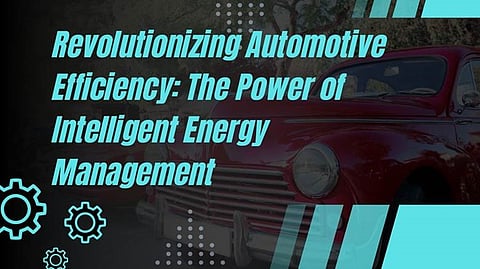

A New Era of Automotive Sustainability, Ravinder Katla a seasoned expert in automotive engineering, explores a groundbreaking innovation in vehicle software—efficient power modeling. With the automotive industry striving for sustainability, his research sheds light on how intelligent power management is reshaping energy efficiency and reducing environmental impact.
Modern vehicles rely on sophisticated electronic control units (ECUs) to manage everything from infotainment systems to power steering. However, these systems continuously consume energy, even when not in active use. Power modding technology addresses this inefficiency by employing advanced algorithms that transition vehicle components between operational states based on real-time needs, significantly reducing unnecessary power consumption.
These intelligent systems utilize distributed sensor networks to monitor vehicle conditions and user behaviors, enabling precise timing of component activation cycles. The implementation of dynamic voltage frequency scaling further optimizes power delivery across diverse operational scenarios. Additionally, enhanced power domain isolation techniques prevent parasitic current leakage between systems, maximizing energy conservation during standby modes. Thermal management integration also plays a crucial role, as optimized operating temperatures directly impact power efficiency, creating a comprehensive approach that extends battery life in electric vehicles and improves fuel economy in conventional powertrains.
Whether in electric or internal combustion engine vehicles, power modding plays a crucial role in optimizing energy use. By selectively deactivating non-essential systems, vehicles experience an energy consumption reduction of up to 22%, extending the battery range in electric cars and improving fuel efficiency in conventional models. The implementation of predictive algorithms further enhances these savings by dynamically adjusting power distribution based on driving patterns and environmental conditions.
Lithium-ion batteries are the cornerstone of modern electric vehicles, yet their production contributes significantly to carbon emissions. Power molding mitigates battery degradation by regulating charge-discharge cycles, reducing thermal stress, and preventing deep discharges. This extends battery lifespan by up to 30%, decreasing the frequency of battery replacements and the environmental burden of battery production.
By minimizing the power drawn from auxiliary systems, power modeling directly reduces emissions. Internal combustion vehicles experience lower CO₂ output due to decreased alternator loads, while electric vehicles benefit from reduced grid electricity consumption. These optimizations collectively contribute to significant reductions in lifecycle carbon footprints, positioning power modeling as a key player in sustainable transportation.
Beyond energy conservation, power modeling enhances the longevity of electronic components, leading to reduced waste generation. The extended service life of ECUs, battery management systems, and thermal controllers translates to fewer replacements, minimizing electronic waste and lessening the environmental impact of raw material extraction and disposal.
The integration of power modeling into modern vehicles requires overcoming technical hurdles, particularly in managing complex electronic architectures. Standardization efforts, such as compliance with ISO 26262, are streamlining the adoption of these technologies while ensuring safety and reliability. Advanced power domain structures and predictive system wake-up sequences further refine efficiency gains without compromising vehicle performance.
These developments facilitate seamless integration with existing vehicle systems, enabling real-time power optimization across multiple control units. Machine learning algorithms enhance these capabilities by adapting power allocation based on usage patterns and environmental conditions. Furthermore, the emergence of consolidated zonal architectures supports more centralized power management, reducing wiring complexity while improving diagnostic capabilities, ultimately leading to more sustainable and energy-efficient transportation solutions.
It will evolve into even greater efficiencies, even with such power modding, as it moves ahead into electrification and autonomy. This is how intelligent power control will present machine learning for predictive energy management: it will be able to integrate with the next generation of vehicle architectures. It will continue with industry collaboration in order for this technology to be broadly adopted.
To further increase the capabilities of this transformation, the next generation of power management ICs will evolve from improving thermal performance to being able to integrate more highly miniaturized designing components. Vehicle-to-grid capability would expand the future utilities of smart power systems beyond the vehicle alone and open up innovative approaches to new energy ecosystems. As simulated modelling tools take such leaps ahead, engineers will be able to model even complete vehicle power profiles with unprecedented accuracy, allowing design optimizations to be made before physical prototyping, speeding development cycles, and cutting costs and environmental impact across the whole automotive value chain.
Power modeling can boost technical advancement; it is a new paradigm in sustainable mobility. The strategic energy management makes vehicles produce lower emissions, have longer battery life, and reduce waste-all things that mark a turning point toward a greener future. As Ravinder Katla's research shows, this innovation will change the landscape of automobile efficaciousness and environmental concern for years to come.
